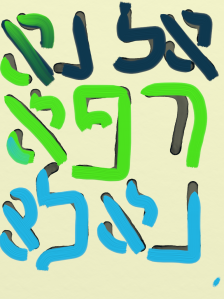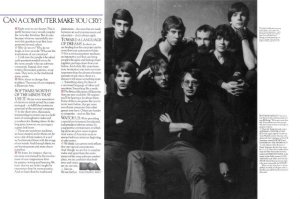I'm Back, and with a new look. Actually a new blog as well.
I moved from Blogger to WordPress for a bunch of reasons,(and if you are readin this on Blogger now posting on both platforms) most of all to consolidate the stuff I have on my website with the Blog - and thus handle maintenance with everything better, easier and with some other nice features.
A friend of mine encouraged me to write again, and I have just completed a witting project which topped out at 30,000 words. Thing is, I enjoyed that experienced of writing, so when my friend made that suggestion, it tipped the scales and here I am again.
This weeks portion Emor, is kind of appropriate to be a re-introduction to Shlomo's drash.
And the LORD said unto Moses: Speak unto the priests the sons of Aaron, and say unto them: There shall none defile himself for the dead among his people; 2 except for his kin, that is near unto him, for his mother, and for his father, and for his son, and for his daughter, and for his brother; 3 and for his sister a virgin, that is near unto him, that hath had no husband, for her may he defile himself.[Leviticus 21]
It was an irony that over a decade ago, first day I walked into a synagogue to go to services after my long self-imposed exile from Judaism was the same day the Rabbi's mother died. As someone new to the congregation, I did not know how to respond,and what would be considered respectful. I did go again to that synagogue, and became a quite active member there for a time. But I never gave a thought to how a religious leader, or for that matter any individual handles a death of immediate family.
Now my mom is dead for four months and I understand that passage bit more. Interestingly the Torah reads in Hebrew for the end of Verse 21:1 לנפש לא-ייטמא בעמיו., and doesn't mention death. Two more literal translations are
don't defile yourself with your people or for
flesh/soul don't defile with your people. Targum Onkelos has על מית לא יסתאב בעמיה which does include the word dead. Verse 21:2 contextually makes it clear we are talking about death.
In particular, the priest as we read elsewhere is not to be in the presence of anywhere where there is death or the dead. But the exception was made that a priest could see the body of their deceased immediate relative. I understand now how upsetting and world-changing such an event could be. To be forbidden from mourning and burying one's relatives is a horrible thing. To do so in a person who handles dangerous things, or with great responsibility, needs to have some way of setting things right and mourning. Seeing one's loved one last time, saying goodbye is very important. Indeed Aaron's family has already gone through this, with the death of Aaron's sons.
I remember my Grandmother's death, where I was not allowed to mourn. I wanted to be part of the minyan for my grandfather, but I choose not to wear tefillin when I pray in the mornings, which I did every morning back then. While My grandfather is not Orthodox, we prayed in an Orthodox minyan who insisted in me wearing tefillin. My refusal meant I was not part of a minyan -- actually the tenth person. It hurt me as much as my grandmothers death that Jews thought I was not Jewish. That they took my atheist brother-in law strapped the tefillin on him and counted him as the tenth hurt more - tefillin were the indications of being Jewish, not kavvanah, nor keeping even more kosher than most of these people (I was vegetarian at the time) nor my own daily Davven, nor my Torah study. The dirty looks as we davvened that morning never left my memory. It hurt so much that I stopped davvening every mornings, and tefillin became not just something I didn't wear for my own reasons, but a hated object to me.
I realize everybody has their traditions. Talmud goes out of its way to remind everyone of that repeatedly. It is a mitzvah to bind a sign on your hand and put something between your eyes. If this mitzvah alone, strapping some leather on, makes one Jewish in that congregation, then that is what makes someone Jewish. I just keep away from their services, and find someone who respects who I am. I believe this is one of those situation where it is not those in attendance but their rabbi (who wasn't there at the time), the one who leads and teaches them that is guilty of anything. I'll let this be decided between Ha Kadosh Baruch Hu and this Rabbi. Yet this same rabbi I'll admit taught me an interesting tradition i did not know until mt grandmother's death. There is tradition from the time of death to the time of the funeral, a mourner is exempt from mitzvot, since he or she has no good sense of judgement. We all had bad judgement and stubbornness back then, both congregants and me.
As upset as I was about being labeled not Jewish while my grandfather, mother and aunt were sitting shiva, I was also upset about something else as well. My grandmother would never see me married. I am, in some sense the failure of the family. I was the one who didn't get married and have kids like I was supposed to on the time table i was supposed to. That was even more upsetting -- failing her expectations, though I know very well back then and now I had not found someone who would make a good marriage back then.
We no longer have a Temple, and so the idea of taamei, ritual defilement, is very different today. The mitzvah of permitting a priest to defile himself for his mother father, children and siblings, is different too. Those who are close mourn differently than those who are more distant.
WhenAaron's sons Nadab and Abihu died, Aaron stayed silent. When discussing this a few weeks ago, I made an observation I wouldn't have made even a year ago. Aaron stayed silent for the same reason Job remained silent: so he wouldn't curse God. Job was even urged by his wife to go ahead and curse, but he refused. I happen to be angry at God, and I'm not keeping quiet. In the case of Aaron at least, he knew the name of God. As we read at the end of the protion blespheming with that does get you killed. I don't know that name, so my anger is different.
I want to scream at God still for taking my mom. I know everyone eventually dies, but just to give her a few more months, one more year. When she was sick and in a coma, I prayed not to extend her life indefinitely, but to get just one more year -- for her to be there for my wedding, to see with her own eyes the joy of Sweetie and I as husband and wife under the Huppa. My last real conversation with her was a detail about our wedding plans. Twenty minutes later she fell ill, and was in a hospital till she took her last breath three weeks later.

We had plenty of miracles to be sure. She survived the condition that put her in the hospital in the first place and the historically extensive surgery which was a success. SHe came out of a coma once. But the miracle of her being happy at Sweetie's and my wedding, standing or sitting next to us wasn't to happen.

So I've spent the last few months not just feeling like I failed, but God sadistically snatched defeat from the jaws of victory. After all that prayer, particularly the heartfelt prayer I did at the Wall in Jerusalem, God did bring me the love of my life. Yet All that prayer seems to be wasted for the three weeks I did nothing but pray fr my mo to survive this ordeal. All I have wanted for years is all of my family at my wedding. Selfishly I wanted what every one of my family's generation got, yet I'm the one not to get it.
I've been so angry at God for the death of my mom, for taking away a rock of stability in my world. It's been hard to think lately, and I could not even write this blog for months. It's been hard to go a pray, even though I am obligated to say the Kaddish, which I do when I go. It seems God failed me this year,and I'm so angry with no way to show it. Singing praises seems so hollow and empty.
I finally did yell at God -- with bacon cheeseburger. For the first time in over a decade I ate beef and pork with cheese. While I might not keep glatt kosher, I do not eat milk with red meat. But in a sign of protest, a way of yelling at God I broke one of the mitzvot, what I have described in the past as love notes to God, I keep so dearly. To make the point I did not just order it and eat it, I said a hamotzi over it. I kept every other rule, even a few I don't normally. but then I went and ate it the sandwich, which actually, being from a fast food restaurant, was tasteless. That was my protest.
Oddly, when I got back to my office I found out I have the largest tax bill I have ever had from the IRS. I'm still not sure what that means.
Defile is quite an odd word for the text the week, but I understand it. If one believes in God and struggles to figure out what is God's actions and what are our own, if one struggles with the nature of prayer and the sacred, it is very hard to reconcile why people die when they do, particularly when it is someone very close to you. I do not believe the text means the defilement that a priest gets from being around or touching the dead but the defilement that leads to crazy thinking, of breaking rules that were sacrosanct only a little while ago. Some we are too distraught to care we break, some we break intentionally to vent our anger at God. The Torah tells us here that's it's okay, it human to be that way when a partner, a mother or a father, a daughter or a son dies. We hopefully will heal and go back to our normal activities. But until we do, we are given leeway.
My mom loved my writing this blog. So it is only fitting that I start it again on Mother's day, since I cannot get her anything else.










